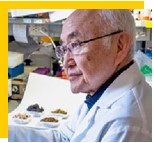NFCR Translational Research: Liver Cancer
Phase II Clinical Trial of Botanical Drug with Multiple Anti-Cancer Properties Treating Patients with Hepatitis B- Associated Liver Cancer

Yung-Chi Cheng, Ph.D. Yale University, New Haven, CT
Dr. Yung-Chi Cheng and his team developed a four-herb formulation into YIV-906. The botanical drug has multiple anti-cancer properties and enhances immunotherapy and chemotherapy. In previous early-stage Phase I/II clinical trials for colorectal, liver, and pancreatic cancers, YIV-906 demonstrated safety and promising efficacy, with the potential to improve survival and quality of life for patients
NFCR’s continued funding helped Dr. Cheng develop his lab’s exclusive botanical drug quality control and monitoring platform.
Since 2020, a global Phase II clinical trial is treating patients with Hepatitis B (+) associated advanced hepatocellular (liver) carcinoma with YIV-906 combined with a frontline drug. Since YIV-906 also protects the gastrointestinal tract from harsh side effects of many therapies, the botanical should alleviate adverse effects of the frontline drug. With success in the final phase clinical trials, YIV-906 could become the first U.S.-approved botanical cancer drug. Once approved, testing and approval of YIV-906 in other cancers can occur so more patients may benefit.
New Treatment for Patients with Advanced Liver Cancer in Phase I Clinical Trial

Ronald A. DePinho, M.D. Univ. of Texas MD Anderson Cancer Center, Houston, Texas
STAT3 is a major signaling protein in cells. Hyperactivation of STAT3 occurs in over 50% of cancers including liver cancer, resulting in abnormal cell growth, escape from our immune system, metastasis (spreading), and other cancer-associated processes. The development of drugs to target STAT3 effectively has been a challenge for the research community, earning it the label of ‘undruggable’.
Ronald DePinho, M.D. and his colleagues used computer-based drug screening of hundreds of thousands of compounds to identify several candidates that inhibit STAT3 protein when tested in complex tumor models of breast and other various cancers.
NFCR support facilitated the final studies of the most promising inhibitor of STAT3. The inhibitor drug is now treating patients in an ongoing Phase I clinical trial to establish its safety and appropriate dose. Patients with advanced liver cancer and other advanced cancers may be eligible to enroll in the trial of this new treatment.
Development of New Inhibitor of Cancer Invasion into Healthy Tissue and Metastasis

Paul B. Fisher, M.Ph., Ph.D. Virginia Commonwealth University, Richmond, VA
Invasion of cancer cells into healthy tissue is a hallmark property of cancer. MDA-9/Syntenin is a pro-invasion and pro-metastatic gene discovered by Dr. Paul Fisher with NFCR funds. With leading-edge chemistry and drug design techniques, his team developed the drug, PDZ1i, to inhibit invasion and metastasis properties of MDA-9/Syntenin. PDZ1i shows profound “anti-invasive” and “anti-metastatic” activity in models of liver, brain, lung, pancreas, breast and prostate cancer and melanoma and neuroblastoma. PDZ1i works well with chemotherapy, radiation, or immunotherapy to kill cancer cells. Patients with hepatocellular cancer (HCC)—the main type of liver cancer, need effective treatments to save their lives. NFCR funds are advancing the required pre-clinical research of PDZ1i to apply for the IND (Investigational New Drug) application and gain FDA approval for a Phase 1 clinical trial for HCC patients. Success in the trial for HCC patients will facilitate future trials of PDZ1i treatment for other types of cancer.










